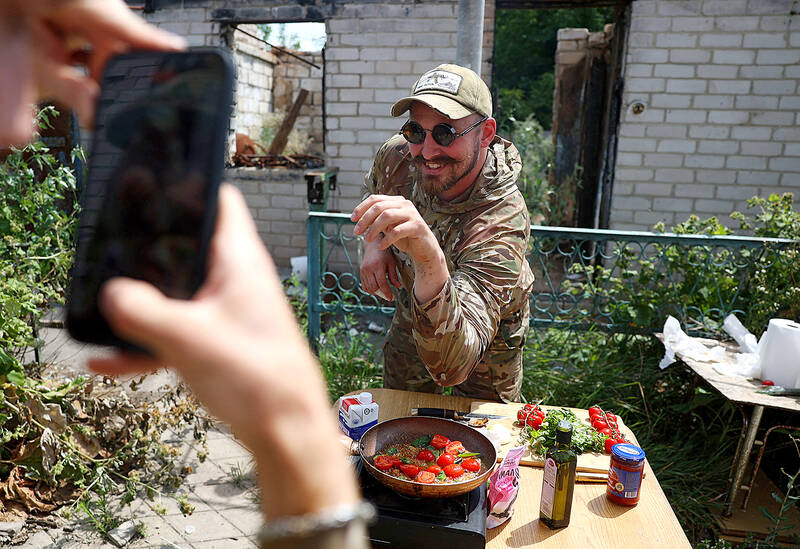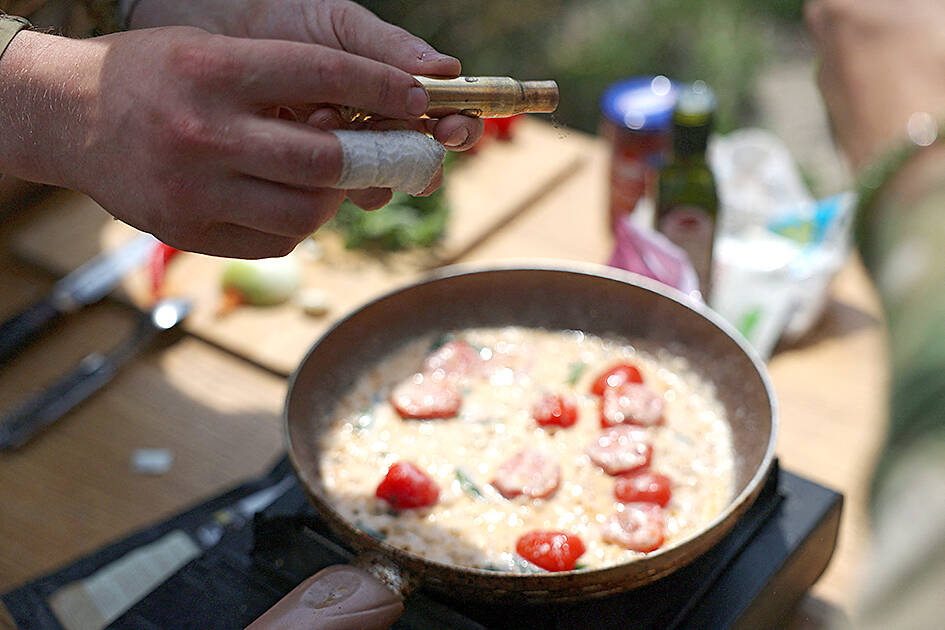Standing amid ruins in east Ukraine, Ruslan Mokrytskyi held a combat knife and concentrated on cutting onions without crying. As trivial as it seems on the front line, it is still not easy.
The mustachioed 32-year-old in military fatigues instructed his comrade to get the right shot of him with his phone. The angle matters. Mokrytskyi is one of Ukraine’s soldier-influencers keeping up spirits in times of war and has 131,600 followers on TikTok.
“Take a close-up of my fingers,” he told his friend, a cameraman for the day. “Lower the frame.”

Photo: AFP
The shot showed his shrapnel-scarred hands as he peeled the onions carefully.
Mokrytskyi’s social media profile describes his life as a part-time celebrity chef and soldier in a nutshell: “A cook from the hell of war.” The day this reporter met him, he revisited an Italian classic, pasta all’arrabbiata.
Just 24 hours earlier, he was a drone pilot in what he called the “hell of Toretsk” — defending the eastern city that Russia has been trying to capture for months.

Photo: AFP
MENTAL RECUPERATION
At the front since the start of the war in 2022, Mokrytskyi needed a form of escape while being under constant fire.
“After missions, there were, let’s say ... many horrible and stressful images,” he said. “I needed to recuperate mentally.”
He tried to forget the horrors by plunging into films, music, reading and going on walks despite the bombs. But nothing worked.
“I got to the point where I told myself that it would be cool to film myself making fries,” the soldier said.
The success of that idea exceeded his expectations: his fries video got three million views. Encouraged, Mokrytskyi involved friends from his battalion, who would call their wives to get ideas for recipes. He then realized he was not only helping his own mental health but that of his comrades too.
“Everyone was joking around,” he said. “It’s not just me rebuilding myself mentally, but also everyone around me.”
His video sessions offer “an hour or two” of light-heartedness — an unusual feeling on the front in Donbas, where fighting has been incessant for two and half years since Moscow invaded.
His fellow battalion member Ivan played with the camera and looked delighted with the uplifting break from war. Normally, Ivan’s nights are restless.
“When I film Ruslan, I don’t think about the war,” the 25-year-old said, adding that he also gets the extra bonus of a good meal while helping make the videos.
On his TikTok page, Mokrytskyi’s content alternates between cooking recipes and raw images showing the realities of war. On top of having “vital” psychological benefits, running the social media page means the soldier retains a link with civilian life. It also allows civilians as well as his family — to keep informed on what a soldier’s life is like in the east.
Mokrytskyi said that “if you do not have contact with your family, you can go mad.”
UNDERMINING ENEMY STEREOTYPES
He strives to make the content entertaining but war-related, like converting a rifle cartridge into a pepper shaker and using products found in destroyed cities he travels through.
Now a recognizable face, some businesses are getting interested in Mokrytskyi.
“An energy drinks company approached me,” he said, to make him a brand ambassador. “They sent packs of drinks and helped me when I was wounded,” he added, his hands still bearing the scars.
He initially got generous donations from civilians but, after two and a half years of war, those have dried up. Yet he knows his videos help keep up Ukrainian spirits — and even may be helping undermine the enemy’s stereotypes.
“The Russians also watch my videos,” he said with a smile. “They see that we are ordinary people defending their country, and not fascists or I don’t know what else,” he said, referring to Moscow’s portrayal of Ukraine.
This in part motivates him running his channel, despite his very demanding obligations as a soldier. When a friend was killed it took him “four days to get back my spirits” but then he went back to making videos.
Back on his cooking spree, the aroma of hot parmesan was rising above the ruins and Mokrytskyi emptied the pasta onto the plastic plates of his comrades.
Smiles lit up their faces.

The canonical shot of an East Asian city is a night skyline studded with towering apartment and office buildings, bright with neon and plastic signage, a landscape of energy and modernity. Another classic image is the same city seen from above, in which identical apartment towers march across the city, spilling out over nearby geography, like stylized soldiers colonizing new territory in a board game. Densely populated dynamic conurbations of money, technological innovation and convenience, it is hard to see the cities of East Asia as what they truly are: necropolises. Why is this? The East Asian development model, with

June 16 to June 22 The following flyer appeared on the streets of Hsinchu on June 12, 1895: “Taipei has already fallen to the Japanese barbarians, who have brought great misery to our land and people. We heard that the Japanese occupiers will tax our gardens, our houses, our bodies, and even our chickens, dogs, cows and pigs. They wear their hair wild, carve their teeth, tattoo their foreheads, wear strange clothes and speak a strange language. How can we be ruled by such people?” Posted by civilian militia leader Wu Tang-hsing (吳湯興), it was a call to arms to retake

This is a deeply unsettling period in Taiwan. Uncertainties are everywhere while everyone waits for a small army of other shoes to drop on nearly every front. During challenging times, interesting political changes can happen, yet all three major political parties are beset with scandals, strife and self-inflicted wounds. As the ruling party, the Democratic Progressive Party (DPP) is held accountable for not only the challenges to the party, but also the nation. Taiwan is geopolitically and economically under threat. Domestically, the administration is under siege by the opposition-controlled legislature and growing discontent with what opponents characterize as arrogant, autocratic

When Lisa, 20, laces into her ultra-high heels for her shift at a strip club in Ukraine’s Kharkiv, she knows that aside from dancing, she will have to comfort traumatized soldiers. Since Russia’s 2022 invasion, exhausted troops are the main clientele of the Flash Dancers club in the center of the northeastern city, just 20 kilometers from Russian forces. For some customers, it provides an “escape” from the war, said Valerya Zavatska — a 25-year-old law graduate who runs the club with her mother, an ex-dancer. But many are not there just for the show. They “want to talk about what hurts,” she